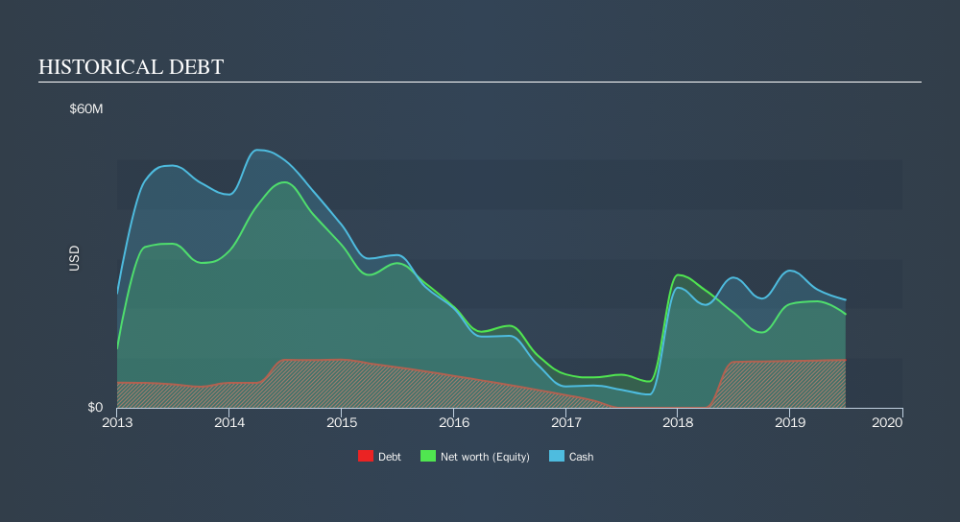Is Celsion (NASDAQ:CLSN) Using Debt In A Risky Way?

Legendary fund manager Li Lu (who Charlie Munger backed) once said, 'The biggest investment risk is not the volatility of prices, but whether you will suffer a permanent loss of capital. It's only natural to consider a company's balance sheet when you examine how risky it is, since debt is often involved when a business collapses. We can see that Celsion Corporation (NASDAQ:CLSN) does use debt in its business. But is this debt a concern to shareholders?
When Is Debt Dangerous?
Generally speaking, debt only becomes a real problem when a company can't easily pay it off, either by raising capital or with its own cash flow. If things get really bad, the lenders can take control of the business. However, a more common (but still painful) scenario is that it has to raise new equity capital at a low price, thus permanently diluting shareholders. Of course, debt can be an important tool in businesses, particularly capital heavy businesses. The first thing to do when considering how much debt a business uses is to look at its cash and debt together.
Check out our latest analysis for Celsion
What Is Celsion's Net Debt?
The image below, which you can click on for greater detail, shows that at June 2019 Celsion had debt of US$9.61m, up from US$9.22m in one year. But on the other hand it also has US$21.7m in cash, leading to a US$12.1m net cash position.
How Strong Is Celsion's Balance Sheet?
We can see from the most recent balance sheet that Celsion had liabilities of US$6.65m falling due within a year, and liabilities of US$18.1m due beyond that. Offsetting this, it had US$21.7m in cash and US$65.7k in receivables that were due within 12 months. So its liabilities outweigh the sum of its cash and (near-term) receivables by US$2.97m.
Since publicly traded Celsion shares are worth a total of US$36.8m, it seems unlikely that this level of liabilities would be a major threat. However, we do think it is worth keeping an eye on its balance sheet strength, as it may change over time. Despite its noteworthy liabilities, Celsion boasts net cash, so it's fair to say it does not have a heavy debt load! When analysing debt levels, the balance sheet is the obvious place to start. But ultimately the future profitability of the business will decide if Celsion can strengthen its balance sheet over time. So if you want to see what the professionals think, you might find this free report on analyst profit forecasts to be interesting.
Over 12 months, Celsion saw its revenue hold pretty steady, and it did not report positive earnings before interest and tax. While that's not too bad, we'd prefer see growth.
So How Risky Is Celsion?
By their very nature companies that are losing money are more risky than those with a long history of profitability. And we do note that Celsion had negative earnings before interest and tax (EBIT), over the last year. Indeed, in that time it burnt through US$8.7m of cash and made a loss of US$7.4m. However, it has net cash of US$12.1m, so it has a bit of time before it will need more capital. Summing up, we're a little skeptical of this one, as it seems fairly risky in the absence of free cashflow. For riskier companies like Celsion I always like to keep an eye on whether insiders are buying or selling. So click here if you want to find out for yourself.
If you're interested in investing in businesses that can grow profits without the burden of debt, then check out this free list of growing businesses that have net cash on the balance sheet.
We aim to bring you long-term focused research analysis driven by fundamental data. Note that our analysis may not factor in the latest price-sensitive company announcements or qualitative material.
If you spot an error that warrants correction, please contact the editor at editorial-team@simplywallst.com. This article by Simply Wall St is general in nature. It does not constitute a recommendation to buy or sell any stock, and does not take account of your objectives, or your financial situation. Simply Wall St has no position in the stocks mentioned. Thank you for reading.

 Yahoo Finance
Yahoo Finance 
